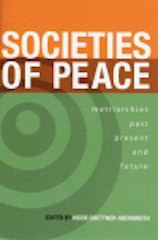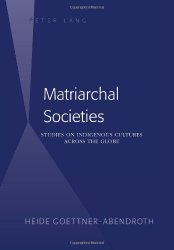“Matriarchy Presents us a well Balanced, Egalitarian and Peaceful
Society without Wars and the Rule of Dominance”
Short Definition
Quoting Heide Göttner-Abendroth:
"Matriarchies are not just a reversal of patriarchy, with women ruling over men – as the usual misinterpretation would have it.
Matriarchies are mother-centered societies, they are based on maternal values: care-taking, nurturing, motherliness, which holds for everybody: for mothers and those who are not mothers, for women and men alike.
Matriarchal societies are consciously built upon these maternal values and motherly work, and this is why they are much more realistic than patriarchies. They are, on principle, need-oriented. Their precepts aim to meet everyone’s needs with the greatest benefit. So, in matriarchies, mothering – which originates as a biological fact – is transformed into a cultural model.
This model is much more appropriate to the human condition than the way patriarchies conceptualise motherhood and use it to make women, and especially mothers, into slaves."
The deep structure of “matriarchal society”
(a structural definition):
Quoting Dr Heide Göttner-Abendroth:
"With matriarchal cultures, equality means more than just a levelling of differences.
Natural differences between the genders and the generations are respected and honoured, but they never serve to create hierarchies, as is common in patriarchy.
The different genders and generations have their own dignity, and through complementary areas of activity, they function in concert one other. More precisely, matriarchies are societies with complementary equality, where great care is taken to provide a balance. This applies to the balance between genders, among generations and between humans and nature.
Maternal values as ethical principles pervade all areas of a matriarchal society.
It creates an attitude of care-taking, nurturing, and peacemaking.
This can be observed on all levels of society:
the economic level,
the social level, the political level and the areas of their
worldviews and faiths."
The Social Level
Quoting Heide Göttner-Abendroth:
"At the social level, matriarchal societies are based on the clan, and on the “symbolic order of the mother”. This also means maternal values as spiritual principles, one that humans take from nature. Mother Nature cares for all beings, however different they may be. The same applies to motherliness: a good mother cares for all her children, embracing their diversity.
This holds true for men as well. If a man in a matriarchal society desires to acquire status among his peers, or even become a representative of the clan to the outside word, then he must be like a “good mother”.
But in matriarchies, you don’t have to be a biological mother in order to be acknowledged as a woman, because matriarchies practice the common motherhood of a group of sisters. Each individual sister does not necessarily have to have children, but together they are all “mothers” of any children that any of them have. This motherhood is founded on the freedom of women to decide on their own about whether or not to have biological children.
This is possible because matriarchal people live together in large kinship groups, formed according to the principle of matrilineality. The clan’s name, and all social status and political titles, are passed on through the mother’s line. Such a matri-clan consists of at least three generations of women, along with their brothers, nephews and maternal uncles. In classic cases, the matri-clan lives in one big clan-house. This is called matrilocality. Their spouses or lovers stay only over-night, in a pattern called “visiting-marriage”. These principles of matrilineality and matrilocality put mothers at the center; in this way women guide their clans without ruling.
In order to achieve social cohesion among the clans of a village or city, complex marriage conventions have been developed that link them in mutually beneficial ways. The intended effect is that all inhabitants of a village or city are related to each other by birth or by marriage. This shapes a society that sees itself as a big clan, where everybody is “mother” or “sister” or “brother” to everybody else.
Thus matriarchies can be defined at the social level as non-hierarchical, horizontal societies of matrilineal kinship."
The Economical Level
Quoting Heide Göttner-Abendroth:
"This social order based on motherhood includes far reaching consequences for the economical level: Matriarchal economy is a subsistence economy. There is no such thing as private property, and there are no territorial claims. The people simply have usage rights on the soil they till, or the pastures their animals graze, for Mother Earth can not be owned or cut up in pieces. She gives the fruits of the fields and the young animals to all people. Parcels of land and a certain number of animals are given to each matri-clan, and are worked on communally.
Most importantly, women have the power of disposition over goods and clan houses, and especially over the sources of nourishment: fields, flocks and food. All the goods are put in the hands of the clan mother, the matriarch, and she, mother of all the clan members, distributes them equally among her children and grand-children. She is responsible for the sustenance and protection of all clan members.
In a matriarchal community, the clans enjoy perfect mutuality: every relative advantage, or disadvantage, in terms of acquiring goods is mediated by social guidelines. For example, at the seasonal festivals of the agricultural year, clans that are comparatively better off will invite all the inhabitants to be their guests. The members of such a clan organize the banquet, the rituals, and the music and dances of one of the annual festivals – and then give away their goods as a gift to all their neighbours. By doing this, they gain nothing except honor. At the next festival in the cycle, another lucky clan will step up, outdoing itself by inviting everybody in the village or neighbourhood, entertaining them all, and dispensing presents.
Since this is the general attitude, matriarchal economy can be called a “gift economy”. It is the economic manifestation of maternal values, which prevents development of an exchange economy and instead fully achieves a gift economy.
Due to these features, matriarchies can be defined at the economical level as societies of balanced economic reciprocity, based on the circulation of gifts."
The Political Level
Quoting Heide Göttner-Abendroth:
"The patterns of the political level follow the principle of consensus, which means unanimity regarding each decision. To manifest a principle like this in practice, a society must be specifically organized todo so, and matrilinear kinship lines are, once again, the starting point.
The basis of each decision-making is the individual clan house. Matters that concern the clan house are decided upon by the women and men in a consensus process, of which the matriarch is the facilitator. Each person has only one vote – even the matriarch – and no member of the household is excluded.
The same applies to decisions concerning the whole village. The clan delegates meet together in the village council, but do not make decisions themselves; they simply communicate the decisions that have been made in their clan houses, and move back and forth, until a consensus decision is reached by the whole village. The same applies at the regional level. The delegates move between the local council and the regional council until consensus of all the villages is reached.
The origin of all politics is in the clan houses, where the people live, and in this way, a true “grass roots democracy” is put into practice.
The result of these practices is that matriarchies are egalitarian societies of consensus. This clearly shows how maternal values also permeate political practice."
The Spritual & Cultural Level
Quoting Heide Göttner-Abendroth:
"But such a societal system as matriarchy could not function as a whole without a deep, supporting and all-permeating spiritual attitude. At the spiritual and cultural level, matriarchal societies do not have hierarchic religions based on an omnipotent male God. In matriarchies, divinity is immanent, for the whole world is regarded as divine: as feminine divine.
This is evident in the widely held concept of the universe as the Great Goddess who brought forth everything by birth, and of the earth as the Great Mother who created everything living. And everyone, and everything, is endowed with divinity by virtue of being a child of the Great Mother Nature.
In such a culture, everything is spiritual. In their festivals, which follow the cycle of the seasons and the cycle of life, everything is celebrated. There is no separation between sacred and secular, so the
everyday tasks also have ritual significance. In this sense matriarchal societies are sacred ones.
The entire societies are constructed in the image of the creative Mother Nature. This divine mother is reflected in every woman’s being, and in her abilities to create. Every social, economic and political action is informed by the principle of the world’s – and the universe’s – all-encompassing maternal attitude.
Therefore, on the spiritual level, matriarchies are sacred societies and cultures of the Divine Feminine or Goddess."
Matriarchy can be defined at the social level as nonhierarchical societies of matrilinieal kinship
Matriarchies are egalitarian societies of consensus. This clearly shows how maternal values also permeate political practice
Matriarchies can be defined at the economical level as societies of balanced economic reciprocity, based on the circulation of gifts
On the spiritual level, matriarchies are sacred societies and cultures of the Divine Feminine or Goddess
Read more in:
Heide Goettner-Abendroth (ed.):
Societies of Peace. Matriarchies Past, Present and Future
Inanna Press, York University, Toronto/Canada 2009
Societies of Peace
Continuation; Lectures ny Western Scholars
Heide Goettner-Abendroth:
Matriarchal Societies. Studies on Indigenous Cultures across the Globe
Peter Lang, New York/USA, March 2012
About the Author
Heide Goettner-Abendroth is a German philosopher and researcher of culture and society who is focused on matriarchal studies. She taught at the University of Munich and was visiting professor at the University of Montreal, Canada and the University of Innsbruck, Austria. She organized and guided two World Congresses on Matriarchal Studies in 2003 and 2005. She was nominated as one of the «1000 Women for the Nobel Peace Prize» in 2005.
Review
«For decades, Heide Goettner-Abendroth has been a serious scholar of the deep history and ongoing traditions of matriarchy in Europe. Her extensive research has taken her through strong historical matriarchies on several continents, drawing together the research of the most modern international scholars on matriarchy. Her book now brings to undeniable light the matriarchal alternatives available to humanity. Goettner-Abendroth should be on the reading list of every women’s studies program.» (Barbara Alice Mann, Ohio Bear Clan Seneca, Assistant Professor in the Honors College of the University of Toledo, and Co-Director of the Native American Alliance of Ohio)
«If in the millenium of women, future generations look back to find the origin of their peaceful societies, they will find that the work of Heide Goettner-Abendroth opened the way. Modern matriarchal studies break through patriarchal capitalist ideology and provide the new/old models for viable ways of life of which our present globalizing market is only a destructive abberation.» (Genevieve Vaughan, Author of ‘For-Giving: A Feminist Criticism of Exchange’ and ‘Women and the Gift Economy: A Radically Different Worldview Is Possible’, and ‘Founder of International Feminists for a Gift Economy’)
«With the publication of this important book, Heide Goettner-Abendroth’s brilliant critical conceptualization of the deep structures shared by matriarchal societies around the world becomes fully available in English. Her theory has developed, not abstractly but inductively, from the analytical investigation of numerous societies by non-indigenous and indigenous researchers. It provides the basis for a full-fledged interdisciplinary and cross-cultural field of matriarchal studies where previously only isolated studies were possible.
Matriarchal studies is a deeply political and liberatory field grounded in an understanding that the destructive patriarchal power structures pervasive today are a historically recent development.
Scholars of matriarchy, some of whom are members of matriarchal societies, are uncovering and reclaiming cultures created mainly by women. Their research offers support for indigenous peoples’ struggles on every continent for land and cultural rights and brings hope to us all that we can build a better world.» (Angela Miles, Professor of Adult Education, Ontario Institute for Studies in Education, Toronto, Canada)
«Heide Goettner-Abendroth has devoted her life to the study of matriarchal societies and the development of modern matriarchal studies.
Her monumental work is presented in this book. As a Western feminist and peace activist this knowledge has transformed almost every facet of my thinking, theorizing, and activism as well as my daily life. My work on, motherhood, sexuality, racism, and above all peace and peace building has been significantly altered by Goettner-Abendroth’s scholarship.
I believe her work offers Western feminists and other progressive scholars as well as social change activists a new, innovative vision of an alternative society – a society of peace and balance, insightful ways to heal the many harms Western civilization brought about, and groundbreaking passages of doing politics, peace building, and conflict resolution.» (Erella Shadmi, Isha L’Isha feminist center, Israel, and former Head of Women’s Studies Program, Beit Berl College, Israel)
«In an ideal world this ground-breaking study would already be required reading in most disciplines from women’s and native studies to anthropology and, most importantly, economics, political science, and religious studies. I predict, however, that in this era of urgent survival studies following the moral, financial, ecological, and climate crises, Heide Göttner Abendroth´s tutorial work will be soon be discovered and recognised as the great and elucidating help it might be building a new kind of peaceful and balanced future.


